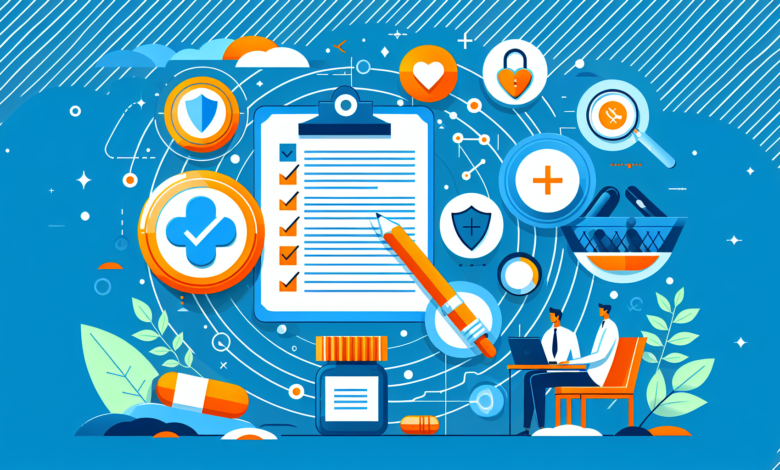The Future of Pharmaceutical Marketing Compliance: AI Takes the Lead

Evolution of Pharmaceutical Marketing Compliance
Traditional Challenges in Pharmaceutical Marketing Compliance
Pharmaceutical marketing compliance has always been a complex and challenging area. Traditional methods often involve manual processes, which can be time-consuming and prone to human error. The regulatory landscape in the pharmaceutical industry is stringent, requiring companies to adhere to numerous guidelines and standards. One of the primary challenges is ensuring that all marketing materials meet these regulations, which can vary significantly from one region to another.
| Compliance Challenge | Description |
|---|---|
| Manual Review Processes | Time-consuming and prone to errors |
| Regional Regulatory Variations | Differing standards across regions |
| High Volume of Materials | Large amounts of content to review |
| Constantly Changing Regulations | Frequent updates to compliance standards |
Traditional compliance methods also struggle with keeping up with the high volume of marketing materials that need to be reviewed. This includes advertisements, social media posts, and educational materials. Ensuring that each piece of content is compliant requires significant resources and meticulous attention to detail.
Moreover, regulations are constantly evolving, making it difficult for companies to stay up-to-date. Non-compliance can result in severe penalties, including fines and reputational damage. As a result, pharmaceutical companies are always on the lookout for more efficient ways to ensure compliance.
Introduction of AI in Pharmaceutical Marketing Compliance
The introduction of Artificial Intelligence (AI) in pharmaceutical marketing compliance marks a significant shift in how companies approach this critical area. AI-powered compliance copilots offer advanced capabilities that traditional methods cannot match. These systems can analyze vast amounts of data in real-time, providing instant feedback and identifying potential compliance issues before they become problems.
AI systems are designed to integrate seamlessly with existing compliance frameworks, enhancing their efficiency and accuracy. For example, AI can automate the review of marketing materials, ensuring that they meet all regulatory requirements. This not only speeds up the approval process but also reduces the risk of human error.
| AI Capability | Benefit |
|---|---|
| Real-time Analysis | Immediate feedback on compliance issues |
| Automated Reviews | Faster and more accurate material checks |
| Data Integration | Seamless integration with existing systems |
| Predictive Analytics | Anticipate future compliance trends |
AI also brings predictive analytics into the fold, allowing companies to anticipate and prepare for future regulatory changes. By analyzing historical data and current trends, AI can provide insights into potential compliance risks, enabling proactive measures.
Furthermore, AI can personalize compliance solutions, tailoring them to the specific needs and requirements of different regions and markets. This ensures that companies can maintain compliance across all their operations, regardless of geographical differences.
The use of AI in pharmaceutical marketing compliance is not just about automation; it’s about enhancing the overall compliance strategy. By leveraging AI, companies can achieve higher levels of efficiency, accuracy, and adaptability, ensuring they remain compliant in an ever-changing regulatory landscape. For more information on AI-driven compliance automation, visit our article on AI-driven marketing compliance automation.
Benefits of AI in Ensuring Compliance
AI is revolutionizing the field of pharmaceutical marketing compliance by offering advanced tools and systems that streamline and enhance the compliance process. Two significant benefits of AI in this domain are enhanced monitoring capabilities and real-time analysis and feedback.
Enhanced Monitoring Capabilities
AI-powered systems provide superior monitoring capabilities, ensuring that all marketing activities comply with regulatory standards. Traditional compliance methods often involve manual checks, which can be time-consuming and prone to human error. AI, however, automates this process, delivering more accurate and efficient monitoring.
AI algorithms can analyze large volumes of data quickly, identifying potential compliance issues before they become significant problems. This proactive approach helps pharmaceutical companies avoid costly fines and maintain their reputation in the market.
| Monitoring Aspect | Traditional Methods | AI-Powered Systems |
|---|---|---|
| Speed | Slow | Fast |
| Accuracy | Variable | High |
| Data Volume Handling | Limited | Extensive |
| Proactivity | Reactive | Proactive |
For more details on how AI enhances monitoring, explore our article on AI-powered compliance copilots.
Real-time Analysis and Feedback
AI technology offers real-time analysis and feedback, which is crucial for maintaining compliance in the fast-paced pharmaceutical industry. Traditional methods may involve periodic reviews, leaving gaps where non-compliant activities can occur unnoticed. AI eliminates these gaps by continuously analyzing data and providing instant feedback.
This real-time capability ensures that any non-compliant activity is identified and addressed immediately. Pharmaceutical professionals can receive alerts and recommendations, allowing them to take corrective actions swiftly. This not only ensures compliance but also optimizes marketing strategies to align with regulatory requirements.
| Feature | Traditional Methods | AI-Powered Systems |
|---|---|---|
| Feedback Timing | Delayed | Immediate |
| Analysis Frequency | Periodic | Continuous |
| Corrective Action Speed | Slow | Fast |
| Alert System | Manual | Automated |
For further insights into real-time analysis and feedback, visit our article on AI-powered marketing compliance software.
AI’s enhanced monitoring capabilities and real-time analysis significantly improve pharmaceutical marketing compliance, making it a valuable asset for the industry. To learn more about the implementation and benefits of AI in compliance, read our article on ai-driven marketing compliance automation.
Implementation of AI in Pharmaceutical Marketing
The integration of AI in pharmaceutical marketing compliance is a significant step towards enhancing the efficiency and accuracy of compliance processes. This section covers how AI can be integrated with existing compliance systems and the necessary training and adoption processes.
Integration with Existing Compliance Systems
Integrating AI with existing compliance systems involves several key steps. AI-powered tools need to be compatible with current systems to streamline operations and ensure seamless functionality. This integration can be achieved through the following methods:
- API Integration: AI tools can be integrated with compliance systems via APIs (Application Programming Interfaces), allowing for real-time data exchange and automated workflows.
- Data Migration: Existing compliance data can be migrated to new AI-driven platforms to ensure continuity and accuracy in monitoring and reporting.
- System Compatibility: Ensuring the AI tools are compatible with existing hardware and software to avoid disruptions in compliance activities.
| Integration Method | Description |
|---|---|
| API Integration | Real-time data exchange and automated workflows |
| Data Migration | Transfer of existing compliance data to AI platforms |
| System Compatibility | Ensuring compatibility with current hardware and software |
For more details on AI integration, refer to our article on ai-powered marketing compliance software.
Training and Adoption Processes
Effective implementation of AI in pharmaceutical marketing compliance requires comprehensive training and adoption strategies. This ensures that all stakeholders are equipped to use the new technology effectively. The following steps can facilitate this process:
- Training Programs: Conducting detailed training sessions for employees to familiarize them with the new AI tools and their functionalities.
- User Manuals and Resources: Providing comprehensive user manuals and resources for reference.
- Pilot Testing: Running pilot tests to identify potential issues and gather feedback, which can be used to refine the implementation process.
- Continuous Support: Offering ongoing support and troubleshooting services to address any challenges that arise during the transition.
| Training Step | Description |
|---|---|
| Training Programs | Sessions for familiarizing employees with AI tools |
| User Manuals | Comprehensive guides for reference |
| Pilot Testing | Identifying issues and gathering feedback |
| Continuous Support | Ongoing troubleshooting services |
For a deeper dive into AI adoption, you can explore our article on ai-powered compliance copilots.
By following these steps, pharmaceutical companies can successfully integrate AI into their compliance systems, ensuring more efficient and accurate monitoring and reporting while maintaining adherence to pharmaceutical marketing regulations.
Regulatory Considerations with AI
In the landscape of pharmaceutical marketing compliance, the integration of AI introduces new regulatory considerations. Ensuring data privacy and security, as well as adherence to industry regulations, becomes paramount.
Ensuring Data Privacy and Security
Data privacy and security are critical when implementing AI in pharmaceutical marketing compliance. AI systems often handle sensitive information, necessitating robust measures to protect data integrity.
Key aspects of ensuring data privacy and security include:
- Data Encryption: Utilizing advanced encryption methods to protect data during transmission and storage.
- Access Controls: Implementing strict access controls to ensure only authorized personnel can access sensitive data.
- Audit Trails: Maintaining detailed logs of data access and modifications to monitor any unauthorized activities.
| Security Measure | Description |
|---|---|
| Data Encryption | Protects data during transmission and storage |
| Access Controls | Limits data access to authorized personnel |
| Audit Trails | Monitors data access and modifications |
For more information on how AI can enhance data security, refer to our article on ai-driven marketing compliance automation.
Compliance with Industry Regulations
AI-powered compliance systems must adhere to existing pharmaceutical marketing regulations to ensure lawful operations. This involves aligning AI functionalities with regulatory requirements and guidelines.
Key considerations for compliance include:
- Regulatory Alignment: Ensuring AI systems are programmed to follow industry-specific regulations.
- Regular Audits: Conducting periodic audits to verify the AI system’s compliance with regulatory standards.
- Documentation: Maintaining comprehensive documentation of AI processes and decisions for regulatory review.
| Regulatory Aspect | Description |
|---|---|
| Regulatory Alignment | AI systems programmed to follow industry regulations |
| Regular Audits | Periodic audits to verify compliance |
| Documentation | Detailed records of AI processes and decisions |
For more insights on compliance with industry regulations, visit our article on pharmaceutical marketing regulations.
By addressing these regulatory considerations, pharmaceutical companies can confidently implement AI-powered compliance solutions, ensuring both data security and adherence to industry standards.
Future Trends in AI-Powered Compliance
AI technology continues to revolutionize pharmaceutical marketing compliance. The future of AI in this domain promises even more sophisticated and effective solutions.
Predictive Analytics for Compliance
Predictive analytics represents a significant advancement in AI-powered compliance. By analyzing historical data, AI algorithms can forecast potential compliance risks before they materialize. This proactive approach allows pharmaceutical companies to address issues preemptively, reducing the likelihood of regulatory breaches.
Using predictive analytics, companies can monitor patterns and trends that indicate non-compliance. For instance, AI can identify unusual marketing activities that deviate from standard practices, flagging them for review. Predictive models can also evaluate the effectiveness of compliance strategies, helping organizations refine their approaches.
| Metric | Traditional Methods | AI-Powered Predictive Analytics |
|---|---|---|
| Risk Detection Time | Weeks to Months | Real-time |
| Accuracy | Moderate | High |
| Resource Allocation | High | Optimized |
For more information on the regulatory framework, visit our article on pharmaceutical marketing regulations.
Personalized Compliance Solutions
AI technology enables the customization of compliance strategies tailored to individual company needs. Personalized compliance solutions leverage AI to adapt to specific marketing practices, regulatory environments, and organizational structures.
By employing machine learning algorithms, AI can analyze vast datasets to understand the unique compliance requirements of each company. This level of personalization ensures that compliance measures are not only effective but also efficient, reducing unnecessary administrative burdens.
Personalized solutions also allow for real-time adjustments based on evolving regulations and market conditions. Companies can stay ahead of compliance challenges, ensuring that their marketing practices consistently meet regulatory standards.
| Feature | Standard Compliance | AI-Powered Personalized Compliance |
|---|---|---|
| Adaptability | Low | High |
| Efficiency | Moderate | Optimized |
| Real-time Adjustments | Limited | Extensive |
Discover how AI is transforming compliance systems in our article on ai-powered marketing compliance software.
AI-driven compliance solutions, including predictive analytics and personalized strategies, represent the future of pharmaceutical marketing compliance. By integrating these advanced technologies, companies can enhance their compliance capabilities, ensuring they remain within regulatory boundaries while optimizing marketing efforts. Explore more about this transformation in our detailed guide on ai-powered compliance copilots.





